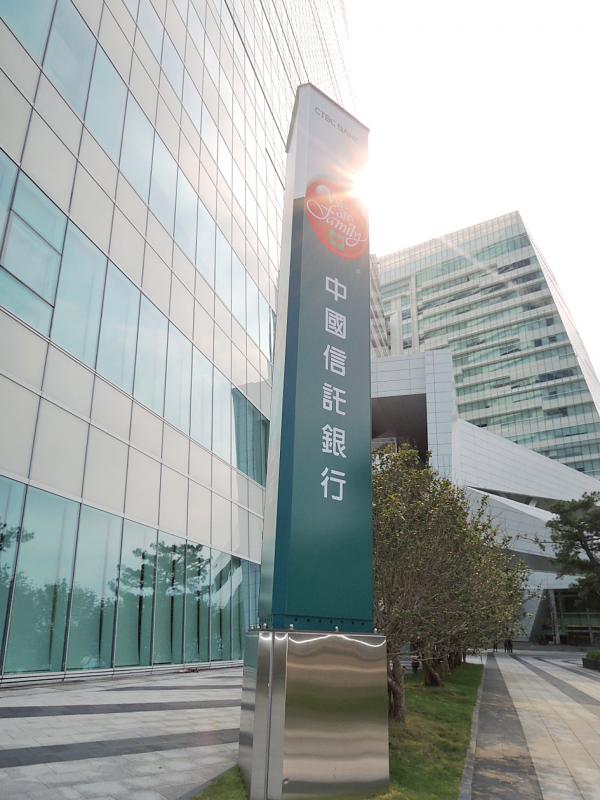CTBC Bank (中信銀行) yesterday gave an upbeat outlook for credit card spending next quarter, thanks to an easing of the COVID-19 situation, the launch of the Quintuple Stimulus Voucher program and the peak season for vehicle sales.
This should boost whole-year credit card spending by more than 7 percent year-on-year, the nation’s biggest credit card issuer said.
Credit card spending by the bank’s customers in the first quarter rose strongly from last year, but spending lost steam in the second quarter amid a worsening COVID-19 situation, bank executive vice president Anderson Chen (陳德風) told reporters at a news conference in Taipei, adding that transactions did not fully recover in July or August.

Photo: Lee Ching-hui, Taipei Times
However, thanks to robust growth in the first quarter, cumulative credit card spending in the first eight months of the year still registered an annual gain of 7 percent, higher than the national average of 3 percent, Chen said.
“We saw credit card spending begin to recover last month, and fueled by the Quintuple Stimulus Voucher program, spending in the fourth quarter is likely to rebound to first-quarter levels,” Chen said.
If the momentum holds, whole-year credit card spending would likely increase more than 7 percent, Chen said.
CTBC Bank yesterday issued a new cobranded credit card with partner Hotai Motor Co (和泰汽車), the local sales agent for Toyota and Lexus vehicles, with the aim of issuing at least 200,000 cards in one year, the bank said.
Collaboration with Hotai Motor and the new credit card are expected to generate new spending, as Hotai’s revenue is about NT$200 billion (US$7.18 billion) per year, mostly in cash, Chen said.
“While most local vehicle buyers need to make a cash purchase or take out a loan, we enable consumers to pay in full via our new cobranded credit card and reward them with 1 percent cashback,” Chen said.
If a card holder’s credit limit is lower than the vehicle’s sales price, they would need to deposit cash with the bank in advance to facilitate the payment, but they would still earn the reward points, Chen said.
This is CTBC Bank’s latest cobranded credit card, after the bank issued cards with CPC Corp, Taiwan (CPC, 台灣中油) and China Airlines Ltd (華航), company data showed.

BYPASSING CHINA TARIFFS: In the first five months of this year, Foxconn sent US$4.4bn of iPhones to the US from India, compared with US$3.7bn in the whole of last year Nearly all the iPhones exported by Foxconn Technology Group (富士康科技集團) from India went to the US between March and last month, customs data showed, far above last year’s average of 50 percent and a clear sign of Apple Inc’s efforts to bypass high US tariffs imposed on China. The numbers, being reported by Reuters for the first time, show that Apple has realigned its India exports to almost exclusively serve the US market, when previously the devices were more widely distributed to nations including the Netherlands and the Czech Republic. During March to last month, Foxconn, known as Hon Hai Precision Industry

Taiwan Semiconductor Manufacturing Co (TSMC, 台積電) and the University of Tokyo (UTokyo) yesterday announced the launch of the TSMC-UTokyo Lab to promote advanced semiconductor research, education and talent development. The lab is TSMC’s first laboratory collaboration with a university outside Taiwan, the company said in a statement. The lab would leverage “the extensive knowledge, experience, and creativity” of both institutions, the company said. It is located in the Asano Section of UTokyo’s Hongo, Tokyo, campus and would be managed by UTokyo faculty, guided by directors from UTokyo and TSMC, the company said. TSMC began working with UTokyo in 2019, resulting in 21 research projects,

Ashton Hall’s morning routine involves dunking his head in iced Saratoga Spring Water. For the company that sells the bottled water — Hall’s brand of choice for drinking, brushing his teeth and submerging himself — that is fantastic news. “We’re so thankful to this incredible fitness influencer called Ashton Hall,” Saratoga owner Primo Brands Corp’s CEO Robbert Rietbroek said on an earnings call after Hall’s morning routine video went viral. “He really helped put our brand on the map.” Primo Brands, which was not affiliated with Hall when he made his video, is among the increasing number of companies benefiting from influencer

Quanta Computer Inc (廣達) chairman Barry Lam (林百里) yesterday expressed a downbeat view about the prospects of humanoid robots, given high manufacturing costs and a lack of target customers. Despite rising demand and high expectations for humanoid robots, high research-and-development costs and uncertain profitability remain major concerns, Lam told reporters following the company’s annual shareholders’ meeting in Taoyuan. “Since it seems a bit unworthy to use such high-cost robots to do household chores, I believe robots designed for specific purposes would be more valuable and present a better business opportunity,” Lam said Instead of investing in humanoid robots, Quanta has opted to invest